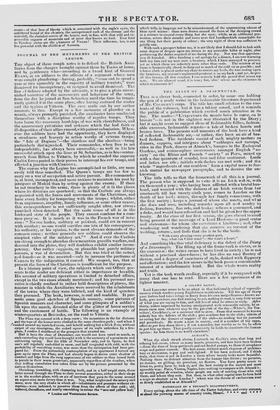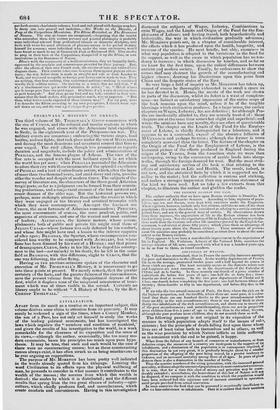THE DIARY OF A DESENNUVRE.
Tins is a clever book, concocted to order, by some one holding the pen of a ready writer in the fashionable literature department of Mr. Connunsi's corps. The title has small relation to the con-
tents of the volumes, but it has a taking sound, and it reminds ŌĆó the public of a publication which excited much attention in its
day. The mottoŌĆö" I: experience du monde brine le ewer, ou he bronze"ŌĆöis not in the slightest way illustrated by the Diary; but it might seem to suggest ideas of fashionable follies, fashion- able excesses, fashionable regretsŌĆöa tale of broken hearts and brazen faces. The persons and manners of the book have a kind of reflected fashionable air,ŌĆöor rather, they have an air of bas- tard fashion. The incidents consist of such mighty matters as dinners, suppers, and intrigues about "cabbages and turnips," rides in the Park, dances at Altnack's, lounges in the Zoological Gardens, and commonplace occurrences amongst English "so- ciety" on the Rhino and French "society" at Paris, mixed up with a due quantum of scandal, love and false sentiment. Lords and ladies are rife ; initials with dashes are met with ; and the whole " ingredients of our cauldron" form a capital mess to fur- nish matter for newspaper paragraphs, and to deceive the un- knowing. The title tells us that the framework of all this is a journal. The person who is supposed to write it is an Irish widew, with six thousand a year ; who having been afflicted with a brutal hus- band, and wearied with the dulness of an Irish estate from her nineteenth till her twenty-sixth year, comes to London on the death of her lord: mixes, through her family connexions, with the first society ; keeps a ,journal of whom she meets, and %slat she does and sees, including remarks upon all and sundry in fashion, furniture, fine arts, and books; refuses a gourmand, and a duke, and would have refused an earl bail he given her the oppor- tunity. At the close of her first season, she goes Areal] to avoid being present at the marriage of a Lord HansonŌĆöa great orator and statesmanŌĆöfor whom she entertains a kindness ; and, after wondering and wondering that bile receives no account of the wedding, returns, and finds that she is to be the bride.
With every pleasing every prudent part, Say, what can Chloe want !ŌĆöShe wants a heart."
And something like this vital deficiency is the defect of the Diary of a Desennuyee. The filling up of the framework is clever, so is the execution : the writer seems to have lived in society ; he is not without a practised shrewdness; he has also an easy fluency of diction, and a degree of smartness of style, dashed with flippancy and affectation ; and the few scenes in the book possess considerable interest of a melodramatic kind. But the whole wants reality and truth.
Yet is the book worth reading, especially if it be compared with many that one has to read. Here are a few specimens of its lighter manner.
A SOLEMN DANDY.
Lord Lancaster seems to be an adept in that fashionable school of supercili- ousness which renders young Englishmen so ridiculous. Till the age of thirty your listless had takes refuge in finery from his own insignificanceŌĆöknows no- body, goes nowhere, can find nothing to eat, nothing to read, is very little aware of what you are saying to him, and still le-4i of what he utters in reply. After thirty, unless improved by having amalgamated with reasonable society, he re treats anew into whatever may be the pet club of the dayŌĆöWhite's, the Tra.. yellers', Crockfora's, or a successor still to arise. From that moment he knows nobody but the fellows of the club ; goes nowhere but to the club ; admits of no eating but the dinners or suppers of the clubŌĆöno reading but its journals and periodicals. He meets a man in society, and if a member of the same, offers to put him down there ; if not a member, but worthy so to be, he offers to put him up there. That goodly community he holds to constitute the human species: fur him there is no world elsewhere !
A LMACK'S.
When the clock struck eleven, I entered, on Cecilia's arm, that long and echoing ball-room, where so many hearts, promises, and fans have been broken ŌĆöfrom the time of hoop-petticoats and red-heeled pumps, to those of airophane crape and patent varnish. The ball-room, without much elegance of architec. tore or decoration, is gay and well-lighted. It has been noticed, and I think truly, that there is not in London a room where beauty looks more beautiful. Nothing there to distract attention from the human face divine; no pictures, no statues, no gilding, no porcelain, no flowers. You have pretty music to listen to, pretty faces to look at, and the best society in the easiest and most agreeable way. Paris, Vienna, Naples, have nothing to compare with Almack's: no weekly point de reunion, where people are sure of meeting those who suit them, and whom they suit. But then, in what other capital does fashion bold a reign so absolute as in London ? where was the throne of excluaivism ever so firmly established u at Almack's?
RATIONALE OF A TOURIST'S DISAPPOINTMENT.
Every spring, about the idle time of the Easter holydays, and every autumn, at about the yawning season of country visits, Messrs. ŌĆó ŌĆó ŌĆó ŌĆó and ŌĆó ŌĆó ŌĆó ŌĆó put forth certain charlatanic volumes, head-and-tail-pieced with foreign wonders, to decoy one into perusal and imitation,ŌĆöSir Weeks on the Danube, A Peep at the Carpathian Mountains, The Rhine Revisited, or The Brunnens of Nassau. The stay -at-homes are enraptured,ŌĆöforgetting that the tourist who astonishes them with written pictures and painted philosophy is probably some individual released from professional labours or domestic drudgery, sent forth with twice his usual allotment of pleasure-money in his pocket to enjoy himself for a season ; some individual who, under the same excitement, would have found as much to say of Greenwich Park or Richmond Hill. They resolve to peep in their turn at the Carpathians, dampschiti it up the Rhine, or seek inspirations in the Brunnens of Nassau.
Biases with the enjoyments of a brilliant existence, they set languidly forth, oppressed by the condor ts and conveniences provided for their journey. But, after the efforts of their own French cook, the cuisine of inns and tables d'In'ire disgusts them. Their courier takes care to secure them against piquant aileen- hires ; the way before them is made as straight and safe as from London to York, and traversed as rapidly as ibreign postdinrses can be made to trot. They see nothing, they hear nothing, they understand nothingŌĆönothing is considered worthy their sublime notice. On arriving in a town, they are told that, " II n'y a absolunient rien qui nitrite l'attention de milor ; " or, " 1i l.pdi n'aura que le temps pour faire son petit repay. D'ailleurs it n'y a rien de curieux dans ce petit Imurgade." And away go my lord and my lady, satisfied iu their con- science that the book -maker, who promised so much, was an impostor. " But then, what better can be expected of those literary men? " Far my part, were I to describe the Rhine according to my own perceptions, I should write my- self down an ass, and the tour a p irriaaye de pas perdas.



























 Previous page
Previous page